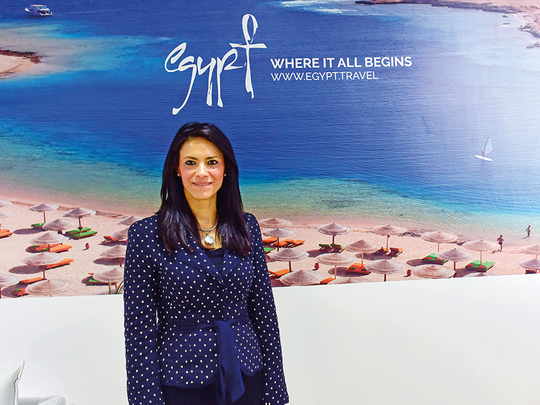
Dubai
Some time in 2019, the Grand Egyptian Museum, home to over 50,000 artefacts, is scheduled to open, more than seven years after work began.
The country’s tourism minister, Rania Al Mashat, says that she hopes the museum will reassert Egypt’s reputation as a cultural destination, after years of political turmoil and economic malaise.
“We’re very proud of our heritage,” Al Mashat told Gulf News in an interview earlier this week during the Arabian Travel Market (ATM), adding: “To put all this culture, and all this heritage, in a modern setting, it’s very appealing.”
“It’s not just an important development for Egypt, but for heritage globally.”
Egypt, once popular with tourists for both its resorts and its sites of historical interest, has suffered in recent years following a string of terror attacks specifically targeting foreign visitors.
Most recently, an explosive device brought down Russia’s Metrojet Flight 9268, flying from seaside resort Sharm Al Shaikh to St Petersburg, killing all 224 tourists and crew on board.
Shortly afterwards, British and Russian airlines cancelled all flights to the destination. The UK’s airlines have still not returned, while Russian charter flights began again this year.
Egyptian officials estimate the damage to the economy at around £10 billion in lost revenue.
“As a country, and as Egyptian people, we have taken very important steps, and continue to take these steps, to secure … To make visitors feel safe and secure,” Al Mashat said.
“The resumption of flights between Moscow and Cairo has been a very positive development, and we are ready to welcome citizens of Great Britain or any other nation at any point in time,” she added.
But the Sinai region continues to struggle: In November 2017, gunmen attacked a Sufi mosque, killing 311 worshippers.
“People need to realise that Sinai is a very big space. The distance between Northern Sinai, where we have some pockets of isolated events, is 500km away from where the resorts are,” Al Mashat said.
And yet Gulf developers continue to invest in the country, with Emaar in particular pouring billions of dirhams into Egypt.
The Dubai-based company has several ongoing hotel agreements across its portfolio of brands, in addition to the master plan development Marassi and an urban residential development in Cairo.
“It’s a very important linchpin for investment development, and the relationship between Egypt as a nation and its neighbours in the region is a very strong one,” the minster said.
To aid this investment, Al Mashat said that she was pushing for legislative reviews, allowing the country to modernise and attract more tourism.
Al Mashat said that at the time many of the country’s tourism laws were drafted, the internet didn’t exist.
“So the whole concept of platforms that help and support tourism — we need to look into that,” she said, adding: “Also — some of the fines that are put on hotels if they do not comply — these have not been changed to be in line with the way that compliance is being evaluated.”
The minister refused to comment on the recent ban of ride-hailing apps Uber and Careem.
Going forward, Al Mashat said she would focus on attracting new visitor markets.
Currently, over 50 per cent of the country’s tourists come from Europe, while a further 30 per cent come from the Gulf countries, and 10 per cent from Asia.
“Going forwards, what is very important for us is to diversify our visitor base. Focus more on Asia, also Eastern Europe, some of the emerging economies like Kazakhstan and so forth. That’s to help make the sector resilient, and less vulnerable to shocks,” she said.












